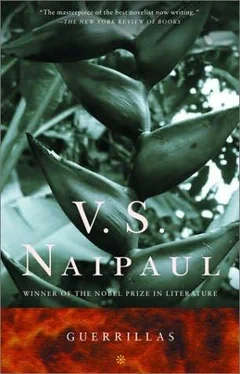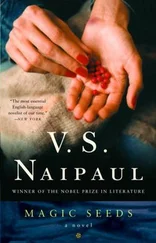V. Naipaul - Guerrillas
Здесь есть возможность читать онлайн «V. Naipaul - Guerrillas» весь текст электронной книги совершенно бесплатно (целиком полную версию без сокращений). В некоторых случаях можно слушать аудио, скачать через торрент в формате fb2 и присутствует краткое содержание. Год выпуска: 1990, ISBN: 1990, Издательство: Vintage, Жанр: Современная проза, на английском языке. Описание произведения, (предисловие) а так же отзывы посетителей доступны на портале библиотеки ЛибКат.
- Название:Guerrillas
- Автор:
- Издательство:Vintage
- Жанр:
- Год:1990
- ISBN:978-0679731740
- Рейтинг книги:5 / 5. Голосов: 1
-
Избранное:Добавить в избранное
- Отзывы:
-
Ваша оценка:
- 100
- 1
- 2
- 3
- 4
- 5
Guerrillas: краткое содержание, описание и аннотация
Предлагаем к чтению аннотацию, описание, краткое содержание или предисловие (зависит от того, что написал сам автор книги «Guerrillas»). Если вы не нашли необходимую информацию о книге — напишите в комментариях, мы постараемся отыскать её.
Guerrillas — читать онлайн бесплатно полную книгу (весь текст) целиком
Ниже представлен текст книги, разбитый по страницам. Система сохранения места последней прочитанной страницы, позволяет с удобством читать онлайн бесплатно книгу «Guerrillas», без необходимости каждый раз заново искать на чём Вы остановились. Поставьте закладку, и сможете в любой момент перейти на страницу, на которой закончили чтение.
Интервал:
Закладка:
Roche knew about this brother of Stephens’: the one who had got away to England before the barriers came down. England, Roche thought: it was so hard to get away from England here. And there were so many Englands: his, Jane’s, Jimmy’s, Lloyd’s, and the England — hard to imagine — in that old woman’s head.
“Yes,” Mrs. Stephens said, coming back into the room with tumblers of grapefruit juice on a tin tray enameled with bright red apples. “Yes, Lloyd’s in London.” She worked through the furniture to Roche. “But Lloyd forget his mother.” She worked her way back to the dining table, dragging her feet and seeming to swing her hips. She held the tray to the old woman and said, “Neighbor?” She sat down and said, as if only to the room, “Yes, Lloyd forget everybody. I don’t know what the sweetness is up there that does make him behave like that.” But she soon made it clear that she knew: the trouble was Lloyd’s wife, the wife who had made him get out. “Yes, neighbor. I don’t grudge anybody. I used to have a man too and I know what it is to want to keep a man. But Hilda gone too far. Anybody would think I do Hilda something. Hilda don’t write me, you know. Hilda’s only writing is to her family. Still, I hear they have everything of the best, and Hilda doing two jobs and everything. Well, let them enjoy it. All that coming to an end soon. They will want to come back here. They will learn that the only people who have anything good for you is your own. The juice sweet enough for you, Mr. Roche? Or you would like some sugar?”
“No, it’s all right, Mrs. Stephens.”
“Yes, neighbor. I used to have a man too. Now I have to fend for myself. When Knolly was here I used to get a few cents, but since he get taken up with that Chinee man I don’t see one red cent from him. Mr. Roche, you must tell Knolly to come and look for his mother some time.”
“I don’t go up there very often, Mrs. Stephens. I go up once or twice a month.”
“Yes, neighbor. I know what it is to want to keep a man.”
“Hilda is like that,” the old woman said. “That is Hilda’s background. Very common. Never-see-come-see. That is Hilda through and through.”
“Yes, my dear. Two jobs, and everything of the best. But they will realize. The only people who have anything good for you is your own. What is the sweetness with that Chinee man, Mr. Roche? Who give him all that big fame in England? What he doing with those boys? Knolly was a good, good boy, don’t mind what people say.” She began, quite suddenly, to cry.
The old woman said, “Neighbor.”
Roche said, “Mrs. Stephens.”
“That Chinee man,” Mrs. Stephens said. “I never like that Chinee man. But I am a supporter of this government, Mr. Roche. This government will never fall.”
“Not while Israel lasts,” the old woman said, and shook her head up and down, smiling, at Roche.
“Yes,” Mrs. Stephens said. “Israel is in her glory.”
“Who ever thought the day would come, Madeleine?”
Mrs. Stephens sighed. “Who ever thought the day would come?” She stood up and made a move, between the dining chair she had been sitting on and the back of the morris settee, toward Roche. “But you not drinking the juice, Mr. Roche. It is not to your liking? You would like some more ice?”
He had been barely sipping, allowing the diluted grapefruit juice to trickle between his almost closed lips and rest without taste below his lower teeth. The tumbler in his hand felt cold and clammy; the hens below the floorboards clucked contentedly in the heat; and through the open window came the smell of dust and chicken dung. The leaves of the breadfruit tree in the next lot were a hard green. The dining table was stained and lackluster; yet Roche had known all the furniture in this room polished and shining.
Mrs. Stephens said: “You would like some more ice?”
He put the tumbler to his mouth and took two long gulps. The thin acrid taste of the grapefruit lingered in his mouth; and he swallowed and sucked, working the taste out.
“Knolly was a good boy,” Mrs. Stephens said, sitting down. “When he was here I always used to see a few cents. I don’t know what kind of sweetness he find up by that Chinee man. I don’t know how he could believe that other people could look after him when they can’t even look after their own.”
She was not concealing her hostility now. Her jaw jutted; her eyes were cold and small; she was speaking more quickly, putting an edge to her voice, and occasionally tripping over a word.
The old woman said, “Madeleine.”
Mrs. Stephens became calmer. “Yes. I too had a man. I too.”
“Hilda is Hilda,” the old woman said. “But you mustn’t forget what Lloyd is.”
“Everything of the best, my dear. That is the message Hilda send to me. You know what Knolly did with the first money he get? The first-first money? He went to town and he buy two bamboo vase stands and he put them up on the wall.”
One was still there, in the corner: a little trapezoid shelf, edged with bamboo strips on which a pattern of diagonal lines had been burnt, braced into a diamond-shaped frame of bamboo strips decorated in the same way. The shelf was empty; little broken cobwebs hung from the dusty bamboo strips. To a child the vase stand must have seemed pretty: it was something about Stephens Roche had never known, though he knew this room well. It was something about himself that Stephens had suppressed.
“Lloyd was born in the days of bondage,” Mrs. Stephens said. “When Knolly born black people was ruling here. Nobody bringing back plantation days, you hear me. Not you or Sablich’s or that Chinee man.”
So far, in her bare, intermittent courtesies to himself and the contrasting gravity of her gossipy manner with the old woman, in her deliberateness, Roche had seen only hostility. Now he saw that Mrs. Stephens was distracted with grief; and this unsettled him more. In her speech, which now seemed to him disordered, he thought he was getting glimpses of a personality and a world that were as alien and shut-in as that choked little room.
He looked at her with something like a smile, to show that he understood, that he was willing to draw her hostility. But as he smiled her rage grew; and he began to be alarmed.
“People have to look after their own,” Mrs. Stephens said.
It was one of the ideas she was playing with, one strand of her anguish that seemed constantly to knot and unknot itself. Roche continued to smile. But the old woman, as though knowing better than Roche what was to follow, said, “Madeleine, Madeleine.”
“Rotten meat,” Mrs. Stephens said.
He could guess the sexual significance of the words. But he wasn’t prepared for the contempt, the contempt of women for women, the contempt which, in that room, from Mrs. Stephens, was like a contempt for her own body and the body of her neighbor, slack, swollen, worn out. The grapefruit taste in Roche’s mouth went bitter; he associated it with the smell of the chicken dung and dust that came through the window; and the saliva thickened nauseously on his tongue.
“That is what they feed up that Chinee man on in England. That is the only sweetness he know. That is what they feed him up on and then they send him down here. Parading through the town with their tight pants sticking up in their crutch. They stink , Mr. Roche. They stink like rotten meat self.”
He laughed, and his lips rode up above his long molars. He laughed at the violence of her language, he thought it was expected of him. But she became enraged, and she held his eyes until he acknowledged her rage. His lips fell back over his teeth; his smile became fixed again.
“I will tell you this, Mr. Roche,” Mrs. Stephens said, leaning forward. “White women marry their own. But they like the Negro men.”
Читать дальшеИнтервал:
Закладка:
Похожие книги на «Guerrillas»
Представляем Вашему вниманию похожие книги на «Guerrillas» списком для выбора. Мы отобрали схожую по названию и смыслу литературу в надежде предоставить читателям больше вариантов отыскать новые, интересные, ещё непрочитанные произведения.
Обсуждение, отзывы о книге «Guerrillas» и просто собственные мнения читателей. Оставьте ваши комментарии, напишите, что Вы думаете о произведении, его смысле или главных героях. Укажите что конкретно понравилось, а что нет, и почему Вы так считаете.












